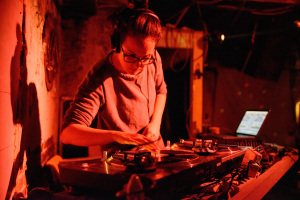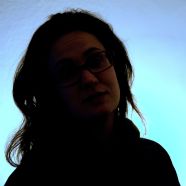Come Home to Experimental Housewife
 For our final podcast of 2014, Femmecult is proud to have Experimental Housewife aka ExHouse (Evelyn Malinowski) behind the decks. Known for a signature style of mashup that excludes few genres, Malinowski’s mixes take the listener on a trip to the outer reaches of expectation. You may have seen her name in print, as a music reviewer for the Berlin based No Fear of Pop blog as well as exploring topics surrounding the recent uproar regarding women in electronic music. You can find musical examples of her production on her bandcamp page, where she forays into the world of psychedelic drone. Please check out the podcast and read our interview below with this fascinating artist at the intersection of music and philosophy.
For our final podcast of 2014, Femmecult is proud to have Experimental Housewife aka ExHouse (Evelyn Malinowski) behind the decks. Known for a signature style of mashup that excludes few genres, Malinowski’s mixes take the listener on a trip to the outer reaches of expectation. You may have seen her name in print, as a music reviewer for the Berlin based No Fear of Pop blog as well as exploring topics surrounding the recent uproar regarding women in electronic music. You can find musical examples of her production on her bandcamp page, where she forays into the world of psychedelic drone. Please check out the podcast and read our interview below with this fascinating artist at the intersection of music and philosophy.
Femmecult-009-ExperimentalHousewife by Femmecult on Mixcloud
Femmecult:
Where do you call home? What is one fun, crazy fact about you that no one really knows, but you wish they did?
Experimental Housewife:
I’ve lived mostly in small towns. I called Berlin home for about four years, and have also lived briefly in Vienna and Reykjavik. Now I’m in Boulder. As far as surprises about myself, I think telling people I’m from Texas always seems a bit of a dubious sounding fact because I don’t sound southern and have been otherwise spending all my adult years in northern destinations. I love the north.
Femmecult:
You work in several mediums, as a musician, DJ and writer. Please talk about how these intersect and feed off of each other?
Experimental Housewife:
One of my greater interests is transition zones, intersections. I like finding ways to have familiar ideas meet and interact with other ideas, especially when they aren’t seen as commonly compatible. This type of interest is what has kept me in academia: literary theory is a vessel for pursuit of synthesis, and a lot of exciting and sometimes nearly magical bridges have been made during my years of study. Rather obviously, DJing can be viewed as similar work. I go after this kind of alchemy using both writing and playing music, which is another intersection in itself.
Femmecult:
How did you get into making music?
Experimental Housewife:
Like a lot of people, I got into music because I’ve been listening to and collecting it for so long. Being a listener motivated a type of musician out of me, and I think it’s important to point that out. Loving music didn’t come from piano lessons or guitar worship: it came from a love of listening.
Femmecult:
You have a unique multilayered amorphous sound, that seems to draw from drone and ambient quite a bit. Please tell us about your process for getting this type of sound?
Experimental Housewife:
I really enjoy letting sounds come to together on their own, however through some research and trial and error. When I listen to music, occasionally a track will remind me of another sound or song, usually rhythmically. Then I try and match the tracks up and I get excited. Incorporating ambient backdrops when fittingly possible helps maintain or echo vibes as well as compliment song transition. It softens the change that occurs, as change is notorious for being hard.
Femmecult:
What kinds of instruments do you use to produce your music?
Experimental Housewife:
Music I’ve made is really more about sound editing rather than production. I’ve used a lot of analog stuff, snare drums and glass bottles, microphone-less vocals from friends, and digital samples. The primary real instrument I play is percussion, so a lot of my approach to editing/arranging is rhythm focused. I also enjoy counteracting the implied neatness of rhythm with drone or anything that doesn’t exactly sound good.
Femmecult:
You have been djing for many years as well. Tell us how you got started, and what motivated you to begin?
Experimental Housewife:
This is a question that tends to lead me toward exposing some real nerdy-ness, suffice to say that I think I’ve always been captivated by the affect of a series of strong, long, and/or emotive mixes. I started when I was 13 and taught myself to beat mix using Pioneer CDJ 700s, but technically have been practicing compilation of music since I was 8 or 9. I spent weekends in 4th grade making epic mix tapes, with Tears For Fears back-to-back with Gus Gus and then the Spice Girls and then The Orb. I’m not really sure what motivated me to do this for so many years. Maybe it’s that mythical thrill DJs have when they create a gorgeous mix and witness what it does to the dance floor. That brings up something else: I’ve actually spent most of my DJ years without a live audience. I’ve done mixes at home or when traveling, and have done college radio off and on for 8 years. I’ve done loads live too, which I of course totally love, but I’m super keen on being in the lab, so to speak. This is another thing that feeds my domestic moniker, since I’m experimenting from within a private space.
Femmecult:
You are known to seamlessly mix many different genres into one DJ set. How do you go about finding songs that match up cohesively in terms of pitch and vibe? What are some mixing techniques you rely on to sharpen your mixes?
Experimental Housewife:
Like I said earlier, I let songs find each other. I also like it when totally disparate styles match up due to more buried characteristics, like an offbeat or twinkly bell pads in the same key. All this helps create an alternative, almost laughable DJ style, one I like to refer to as hypnagogic. I want my mixes to both move and crack up people. I think it happens via the “unbelievable” combos or bulging, compact vibe. This all just takes a bit of trial and error and brainstorming, activities which I love. My most relied on mixing technique is the long mix, one that might stump people’s capability of distinguishing different tracks. Conversely, I also really love slamming mixes, where wiping out the previous track and bursting into the next after a relatively brief beatmatching. It is really exhilarating. I appreciate all known mix types, as well as unknown ones, but the long and repetitive is my favorite. Besides having a right amount of long, narrational transitions, I rely also on ambient or drone tracks and/or samples to blend things up as best as possible. I really think that’s the trick to pairing disparate elements: put them into the same ambience, and they begin to talk. That genre is also a goto because I have a love for and history with noise.
Femmecult:
Tell us a bit about the tracks you selected for the mix you did for Femmecult. What made you decide to include them?
Experimental Housewife:
These are just jams of the moment. Azealia Banks is totally awesome, and this remix reminded me of the Norman Nodge remix of Physical Therapy. The Sting track happened because that album, The Soul Cages, provides a little bit of Montana autumn nostalgia. Empty Taxi I discovered through the female:pressure mailing list and really love, and I found a way to have it match up with Kangding Ray’s “L’envol” by looping a track by Auburn Lull, one of my favorite bands. I wanted to use a track from Isis Graham for Femmecult because I think she’s talented plus holding down the fort for ladies in the scene up in Calgary. Other than that, I selected some NFOP jams and a track from sonofdistantearth, who released on my favorite label discovery of 2014, Lobster Theremin. Had to represent.
Femmecult:
What fascinates you most as a writer?
Experimental Housewife:
I’ve been realizing more and more how most of my bigger, more academic pieces attempt to prove themselves through a conglomeration of theoretical, literary, and mythological examples. In other words, I’ll use some sound theory to analyze a fiction and drive it towards the expanse of archetype and mythology. I guess it’s because I love mythology and patterns. When I write about music, I again seem to try and take whatever stands out for me to a bigger picture. I also indulge in cross-referencing whenever possible.
Femmecult:
What are some topics you’d like to bring attention to with your writing, and why?
Experimental Housewife:
Over the last couple of years I’ve been focusing on the women in electronic music uproar, which I’ve really enjoyed, as it’s totally vital to keep such a discussion going. It isn’t a polemic, or shouldn’t be. It’s just a good, old-fashioned discussion which has already aided in clearing up certain bad attitudes within the scene. It’s also generated bad attitudes. Other than that, I’ve mostly done music reviews and festival coverage for NFOP. The motivation behind writing about music at all comes from a wish to make quality techno in the States more pronounced, to help advocate the vast and rich scene that has existed here since forever ago, despite the ongoing assumption that techno doesn’t live here. I grew up following this music pretty solo, without a flock or community. After finding one in Berlin, I wanted to patch things together stateside too, and it’s been not only easy, but also extremely inspiring. So yeah, writing about music for a Berlin-based blog is a way of keeping up with my community abroad, and also a method for engaging with people here, whether they are known throughout the global community or not.
Femmecult:
What’s on the horizon for you as a writer, dj and musician?
Experimental Housewife:
I just moved to Boulder, Colorado, so we’ll see how that goes. I’ve been asked to open for Pharmakon in February, and will perform at the opening gala for Communikey 2015. I will continue to support and hopefully participate in my good friends’ young but mature-for-its-age conference, the DAT in Missoula, Montana. I have a couple of essays under construction at the moment, including one about contemporary ambient music’s resemblance to fascist aesthetic, and I’m looking to apply for a PhD program in the next year or two.
For more on Experimental Housewife:
https://soundcloud.com/experimental-housewife
https://experimentalhousewife.bandcamp.com/
HAPPY NEW YEAR!!!








Recent Comments